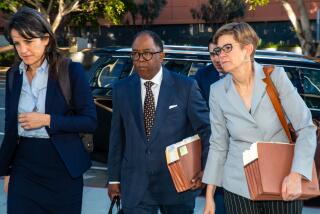Miller Spy Case Goes to Jury : Judge Warns Panelists Not to Talk With Outsiders
The case of Richard W. Miller, the only FBI agent ever charged with espionage, was placed in the hands of a jury Friday by a judge who said: âYour sole intent is to seek the truth from the evidence in this case.â
U.S. District Judge David Kenyon spent two hours instructing jurors in the complex laws of espionage before sending them to begin their deliberations.
âOnce you start talking, you are incommunicado with the rest of the world,â he told the six women and six men, warning them not to let anyone else in on their deliberations.
The jurors ended their deliberations after two hours at 4 p.m., without reaching a verdict. They will resume at 8:30 a.m. Monday.
Miller, 48, a 20-year veteran of the FBI who had been assigned to counterintelligence in Los Angeles, faces a life sentence if convicted on all seven counts of his indictment. He is accused of turning over classified information to the Soviet Union for a promise of $75,000 in cash and gold.
His one-time lover, Soviet emigre Svetlana Ogorodnikova, and her husband, Nikolai, have pleaded guilty to conspiracy in the case and been sentenced to prison.
Jurors heard 11 weeks of testimony and attorney arguments on the central issue of the case: Whether Miller made a deal to pass classified FBI documents to the Soviet Union through Ogorodnikova.
Kenyon noted Friday that Miller cannot be convicted on several counts unless he acted âknowingly and willfully . . . voluntarily and intentionally . . . with bad purpose to violate the law.â
In an often-emotional trial, both sides agreed on one point--that Miller was a professional misfit: Fat, with sloppy work habits, an FBI embarrassment for years. But their interpretations of that pointâs effect were vastly different.
The government claimed that Miller became bitter and vengeful because of his frequent reprimands and his suspension from work. It said he was financially strapped and sexually vulnerable when Ogorodnikova walked into his life and lured him into spying.
The defense said that Miller, despite his problems, was a loyal FBI man. It said he dreamed of salvaging his foundering career with an act of heroism--the infiltration of the KGB, the Soviet intelligence network. They claimed he seized this chance with Ogorodnikova.
Kenyonâs jury instructions, drafted after long conferences with lawyers, included definitions of criminal intent, explanations of the espionage laws and specifics of what jurors must decide to find Miller innocent or guilty.
He added an unusually stern admonition that jurors must not communicate anything about their deliberations to the bailiffs who are guarding them.
His remarks were apparently motivated by allegations of jury tampering in the trial of San Diego Mayor Roger Hedgecock. Two jurors have accused a bailiff of improperly communicating with jurors who convicted Hedgecock of perjury and conspiracy.
At the beginning of his instructions, Kenyon said: âYou are to perform this duty without bias . . . the law does not allow jurors to be influenced by sympathy, prejudice or public opinion . . . you are to reach a just verdict, regardless of the consequences.â
More to Read
Sign up for Essential California
The most important California stories and recommendations in your inbox every morning.
You may occasionally receive promotional content from the Los Angeles Times.










